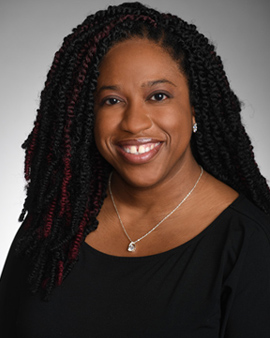An Interview With Annette Gadegbeku, MD
November 4, 2021

Annette Gadegbeku, MD, is an associate professor in the Department of Family, Community & Preventive Medicine, and assistant dean of community health within the Office of Diversity, Equity & Inclusion at Drexel University College of Medicine. Her academic interests include urban and underserved community medicine, adolescent medicine, women’s health and global health.
Can you please tell me a little bit about yourself and why you chose to work at Drexel?
I am originally from northern New Jersey but have been in Philadelphia for 21 years. I came to be faculty with Drexel Family Medicine in 2009. I wanted to practice and teach in the urban underserved setting in Philadelphia. I also knew a couple of colleagues including the chair of the Department of Family, Community & Preventive Medicine at the time. And the mission and vision of where the department was going was in line with what I wanted to do, and I knew would have the opportunity to place my mark
What was your motivation for choosing to get involved in community health?
I have always been drawn to helping people, particularly those who are marginalized and considered “the least of these.” My first influential experience, reminding me why I came to medical school, was at the Temple Cares student-run clinic. I remember we did not have much to offer, yet the patients we saw were so grateful. They were just grateful to have us talk to them and care about them. It was one of the most rewarding experiences I had ever had then. I did not know what family medicine or community health was at the time. But as I continued along in my training, through medical school and residency, and when it was time to decide what direction I would go, I asked myself: “Where will you want to spend your extra time?" I knew I would do things outside of my normal business hours and outside of the four walls of a clinic. I decided I wanted to be in the community.
Tell me about some of the people you met at your community sites.
I’ve met people from all walks of life. I’ve met people of all ages, from babies to the elderly. I’ve met survivors of housing and nutritional insecurities, survivors of a myriad of health conditions – including cancer, now COVID, diabetes, kidney disease, etc. I’ve met those who did not survive but managed to leave their mark of legacy, even on my journey. I’ve met people with stories of resilience and strength. I’ve met people who are anxious and scared. I’ve met people who are angry. I’ve met people who are grateful and proud. I’ve met people who are creative and gifted. I’ve met people (most) who make me laugh. I’ve also met people who have made me cry. And each person I’ve met in these 21 years of service has made me a better physician and a better person.
What poses the biggest challenge in health care for the underserved communities.
The system is broken…a challenge for everyone. The biggest challenge is the umbrella of the disparities deeply rooted and connected in determinants of health.
What would you like to see changed?
A health system that truly supports, cares for and serves people – all people.
How do you like to spend your free time?
I looooove music. So anything that has to do with music: listening, singing, playing. I also love movies, or more recently streaming series. I love to watch sports, particularly football, but I can get into watching almost any sport – especially live. And I like to have fun. I’m a pretty competitive person, so I love to play games, even by myself, but I love a good game night!